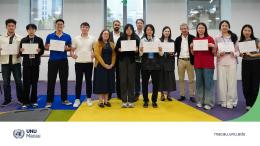
Over the last few years, as AI technologies have been applied to numerous critical technologies in Southeast Asia, certain risks have emerged for groups who were already marginalized. AI technologies developed without safeguards tend to replicate and accentuate societal biases. For example, resumé-screening tools for technology companies have sometimes excluded women, mimicking historical exclusion of women in technology. AI tools determining loan size and eligibility were also criticized for providing much lower loans to women than to men, based only on their gender.
As United Nations member states move towards promoting safe and inclusive AI technologies, namely by implementing the UNESCO Recommendations on the Ethics of AI, Southeast Asian nations have been reflecting on the development of regulatory frameworks that are sensitive to these biases. This research, led by UNU Macau for ITU Regional Office for Asia and the Pacific, investigated gaps and opportunities in gender and other societal biases of AI in Thailand, Malaysia, Indonesia, and the Philippines, with the objective of informing future policy development.
Countries in Southeast Asia have also begun to adopt AI in various sectors, notably in human resources, government services delivery, manufacturing, and agriculture. There is much enthusiasm surrounding these new technologies, with the expectation of a significant contribution to the region’s GDP by 2030. This is translated by both private and public sector investment in training, infrastructure, and local enterprises that, in some cases, are a vibrant addition to the tech sector. Policymakers are therefore tasked with an important challenge, that of, on the one hand, promoting innovation and investment in this very promising field, and, on the other, ensuring that applications are only deployed once they are safe for the public.
The research project involved interviews with members of civil society, government, academia, and the private sector, along with government workshops in each country. The research team also analysed the national strategies and policy documents on AI of each country, to better understand how they took biases into consideration and how they might benefit from a gender lens. Each country has invested considerable time in developing AI strategies that hope to promote its economic benefits while ensuring that they are safe.
The report makes four recommendations, which offer different and complementary pathways towards gender inclusive AI development. These are:
-
Develop a government committee or task force in each country dedicated to societal impacts of AI, including gender impacts;
-
Create national policy guidelines on the development of gender-sensitive AI;
-
Develop safe AI standards that include women across the region, in such a way that they address de-biasing at each stage of the AI lifecycle;
-
Make investments in women in AI networks, trainings, company development and policy participation.
The aim of the report is to inform gender-sensitive AI policy development in each focus country, as well as in Southeast Asia more broadly. Additionally, due to the universalism of gender rights and AI technologies, many of the findings of the report can be used to inform policy development in other countries as well.
Download the full report here.
This report was written by a team led by Eleonore Fournier-Tombs, UNU Macau, composed of JeongHyun Lee and Arthit Suriyawongkul, UNU Macau; Preeti Raghunath, University of Monash in Malaysia; Matthew Dailey, Joyee S. Chatterjee, Philippe Doneys, Wanchanok Sunthorn and Sirayuth Thongprasert, Asia Institute of Technology (AIT); Kris Villanueva, Government of the Philippines; and Febroza Belda, Indonesia.
Suggested citation: Eleonore Fournier-Tombs., "Developing inclusive AI policy in Southeast Asia," UNU Macau (blog), 2023-02-02, 2023, https://unu.edu/macau/blog-post/developing-inclusive-ai-policy-southeast-asia.



